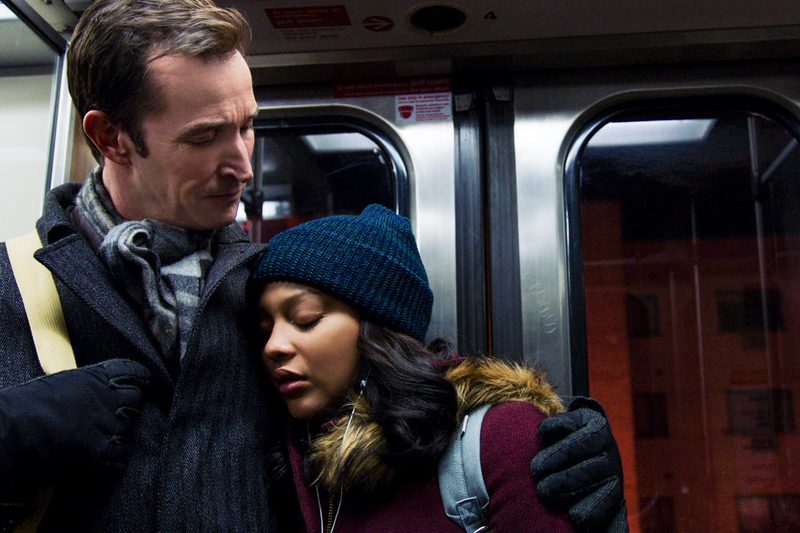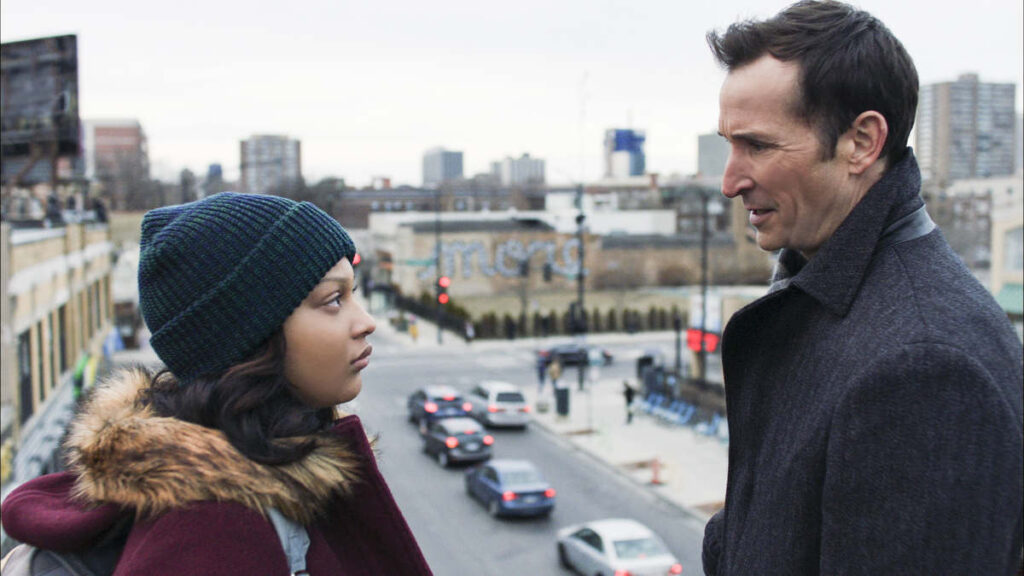“We are all the children of a million hopes,” Daniel Calder (Noah Wyle) says to his A.P. History class on the first day of school. It’s a first day in more ways than one—for the students, it’s the beginning of another school year; for Daniel, it’s his first day back since his husband Harrison (Corey Reynolds), an E.R. doctor and a black man, was shot twice in the back by a white Chicago cop (Noel Fisher) while trying to buy a gallon of milk.
“The Red Line,” the new limited series from executive producers Ava DuVernay and Greg Berlanti and co-creators Caitlin Parrish and Erica Weiss, exists somewhere between the broad inspirational language at the top of this paragraph and the distressing, far too common reality in which it lives. It also floats back and forth between the grim day-to-day of grief and the twists and turns of an evening soap, complete with melodramatic score and the odd cliffhanger. Sometimes that tension works. Yet even at its most frustrating, there’s a combination of earnestness and intelligence that makes “The Red Line” not easy to write off.
Loosely based on Parrish’s play “A Twist Of Water” (also co-created by Weiss), “The Red Line” (premiering Sunday, April 28) follows Daniel and his daughter Jira (Aliyah Royale) as they struggle to cope after Harrison’s murder, taking its name from the 24-hour, mostly above-ground train that runs the length of the city from north to south. (Disclosure: Like “The Red Line,” I also have roots in Chicago theater, and worked briefly with co-creator Weiss on an evening of 10-minute plays a decade ago.) Daniel navigates his grief, the legal system, and the all-important job of parenting a teenage daughter, occasionally with the help of fellow teacher Liam (the endlessly endearing Vinny Chhibber), a good-hearted and sometimes bracingly honest man who’s as supportive of his colleague as he is of that colleague’s daughter, also a student. Jira, on the other hand, feels compelled to find more family for herself, having lost such a huge part of the one she had, and so goes seeking her birth mother.

Elsewhere in the city, Tia Young (Emayatzy Corinealdi) takes on an entrenched Alderman from a South Side district. And then there’s Paul Evans, the cop who shot Harrison, who contends with the legal system, his fellow officers, his petulant but loyal brother (Michael Patrick Thornton), in a wheelchair permanently after being injured in the line of duty, and his partner Vic (Elizabeth Laidlaw), a woman as, if not more, troubled by the events of that night than Paul is himself.
It’s a lot. Throw in a number of “Hey, it’s Chicago!” moments—an argument about whether Cubs or Sox fans are worse, shots of Malört, and an altercation between citizens and police that originates with ‘dibs,’ et cetera—and the landscape seems as crowded as the Lawrence stop on a night that both the Aragon and the Riv have shows running. (Hey, it’s Chicago!) In the early-going, it’s the ideas wrapped up in all these stories, some tended to better than others, that take up the most space. It’s not reductive, but nor is it particularly probing; with regard to race and police brutality in particular, it’s perhaps easiest to describe “The Red Line” as ‘nuance, for beginners.’
<span class="s1" That’s not a bad thing, and when “The Red Line” gets into stuff that goes beyond ‘racism is bad’ and ‘bad cops are bad,’ it’s incredibly compelling. Daniel’s forced to reckon with the fact that Harrison’s death is likely getting more coverage because he’s there to put a white face on the matter. Jira has to contend with micro-aggressions from presumably well-meaning white students, a reality she unknowingly shares with Liam, a gay Muslim. Both struggle with what it means to politicize their grief, what justice means to them, and what they need from and to do for each other. And Paul faces, over and over again, the reality of what he did, what he believes happened, and why he fired.

All that stuff works, or mostly does, because the performances are sound and the writing mostly thoughtful. With regard to the cast, Wyle, Royale, and Laidlaw are particularly good, but there’s not a dud in the bunch. As for the writing, while the ostensible primary throughline—the shooting and its aftermath, which connects all three stories—is largely successful, if occasionally thin, the storyline surrounding Jira’s birth parents could generously be called a mixed bag. While occasionally paying lip service to the idea that Jira’s dads are her dads, and the woman who gave birth to her is her birth mother, not a parent, the series dwells endlessly on the ins and outs, ups and downs of that relationship, as though it’s a given that it should be a hugely important one in Jira’s life. That would be fine, if the show’s primary interest was in how Jira feels about it, and how it shapes her as she processes her loss and rage. Instead, it seems far more concerned with treating it as a soap opera. At one point, after a particularly ridiculous, late-arriving scene, one character tells another, “You turned a campaign event into ‘Maury,’” as if it’s not the show itself that made that choice.
What’s most frustrating about this is that it’s all to the detriment of the development of Jira as a character. As the series fixates on what will happen next in this chapter of her saga, it forgets to treat her relationships as evolving, and while they have decided ups and downs, it’s always a return to the status quo, not to some new stage. That Jira remains a compelling character is due largely to Royale’s simple, straightforward performance; she plays this young woman as a person too worn down to pin her heart anywhere but on her sleeve, and as she and Wyle are even better together than they are individually, even the flimsiest of their scenes together tend to sparkle.
As it happens, “The Red Line” at its best has a great deal in common with Jira, and Royale’s portrayal of her. It’s not subtle, but it is smart. It’s openly emotional, but rarely manipulative. It, too, wears its heart on its sleeve, a quality that enables it to get the best of its occasional heavy-handed dialogue, needlessly twisty plotting, and a tendency to overcrowd and repeat itself. It’s a series that doesn’t shy away from an on-the-nose simile, so I won’t either: like its namesake, “The Red Line” isn’t always inviting, but it is direct and worth traveling on for at least a few stops, if not to the end.
All episodes screened for review.












